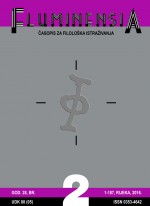POPULAR LITERATURE AND CULTURAL MEMORY ON THE EXAMPLES OF LUKA ILIĆ ORIOVČANIN AND ANDRIJA KAČIĆ MIOŠIĆ
Keywords:
popular literature, cultural memory, truth, history, Andrija Kačić Miošić, Luka Ilić OriovčaninAbstract
In this paper we approach popular literature from the perspective of cultural memory studies, relying mostly on the theoretical insights of Jan and Aleida Assmann. Jan Assmann distinguishes between two modes of memory: communicative memory and cultural memory. Communicative memory relates to a group, takes the form of everyday communications, includes three to four interacting generations and is best illustrated by a mode of biographical memory. On the other hand, cultural memory is based on fixed points in the past, a high degree of formation and ceremonial communication, depends on a specialized practice and always has its specialized carriers.
In this paper a more detailed analysis of the way in which popular literary texts form fixed points in the past, the symbolic figures of memory, is carried out.
The importance of the categories of truth, memory and history is shown on the examples of popular folk writers Andrija Kačić Miošić and Luka Ilić Oriovčanin. Special attention is given to the forewords to Razgovor ugodni naroda slovinskoga (1756, 1759) and Lovorike (1874; 1990). Both Kačić and Oriovčanin show aspirations towards saving historic events and persons from being forgotten. We analyse the importance of memory in popular poetics by asking the following questions: a) what is the subject of memory; b) who remembers; and c) which mechanisms enable memory? A popular writer uses discursive strategies to constitute a community that remembers, as well as content that he wants to keep in memory. He refers to the historical truth, though the category of truth in popular texts can be read, in accordance with Foucault’s approach, as a product of discourse.

